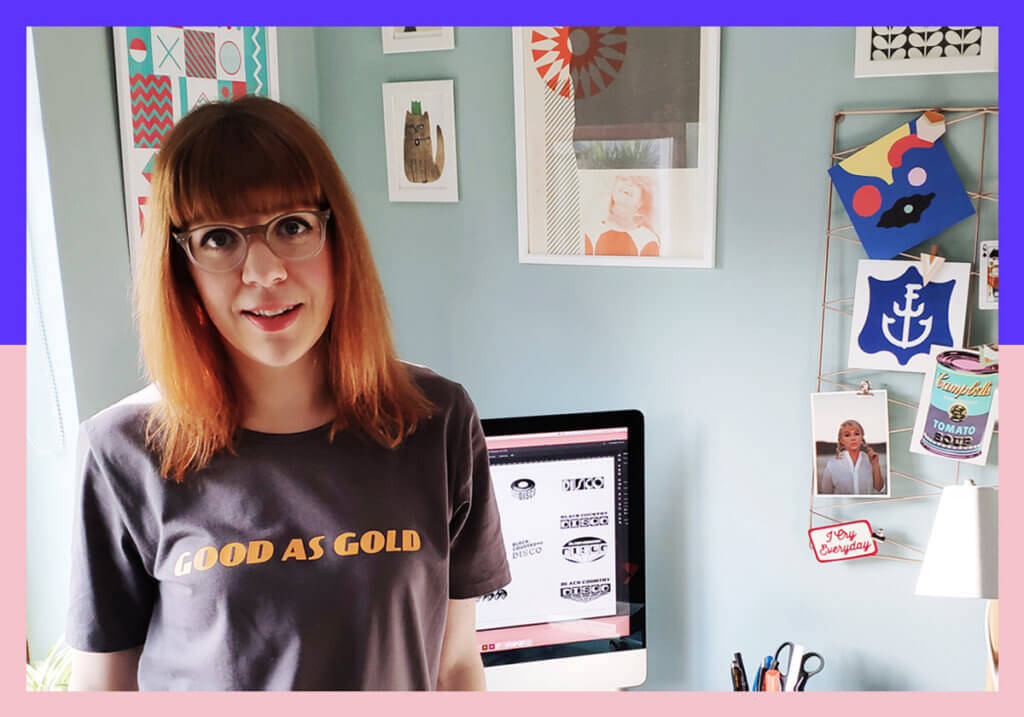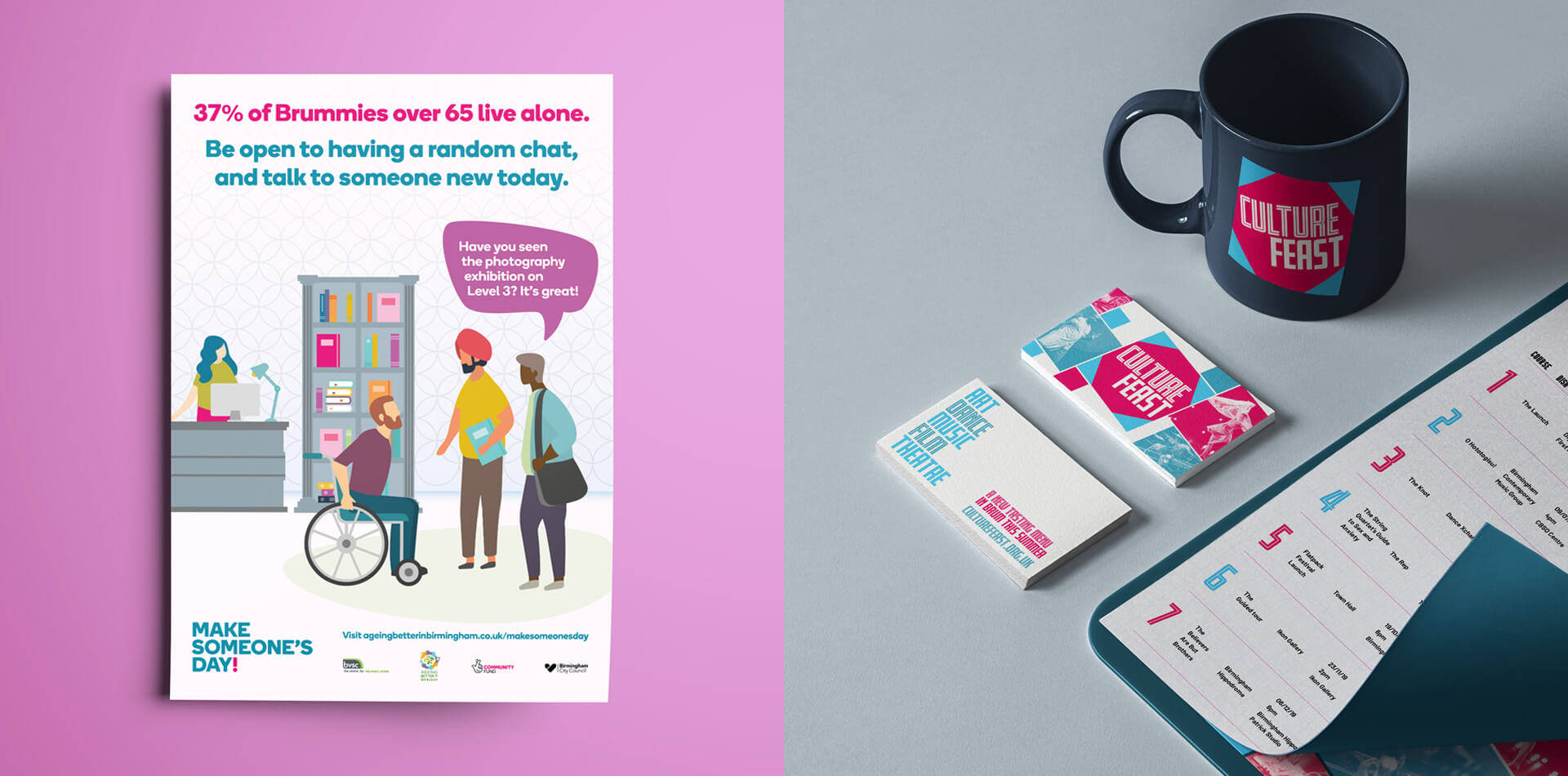Lindsay Baker set up as freelance graphic designer Sister Minor in 2017, she also co-hosts Ladies, Wine & Design Birmingham, a networking group for women in the creative industries and runs Wolverhampton-based clothing and apparel company True Reverie.
Lindsay’s journey to becoming a graphic designer started via a career in arts marketing, which she credits in having given her an invaluable range of contacts, skills and experience for running her own business. After spending five years honing her craft as a designer at a Birmingham based agency progressing to Design Director, she now freelances full-time specialising in projects for the arts, community and cultural sector, and branding for small businesses.
Noticing that many female creatives can feel hesitant when putting themselves forward to speak at events in a male-dominated industry, Lindsay and her co-host Lisa Barrett spotted the need for a local space where women could network and support each other. Now LW&D Birmingham run regular events, talks and workshops where female creatives and designers meet to collaborate, network and form friendships.
Lindsay lives in Wolverhampton with her husband Tim, and their joint venture True Reverie was inspired by their love of the area. With extensive regeneration investment being spent, and a thriving independent business culture, they feel that now is the perfect time to celebrate the local people, sense of community and optimism for the future that make Wolverhampton a great place to live.

We chatted with Lindsay to find out more about her career path, her experiences of the challenges women can face in the design industry and what fuels her passion for running community focused projects and events.
Describe how you first became interested in design and your career path to date.
I’ve always had a passion for drawing since I was little, and growing up, I was really interested in fashion and art, so I’ve always considered myself to be creative. I went to quite an academic secondary school which pushed me in a different direction.
After I finished my degree in Business Management, I studied an additional qualification to become a specialist in Arts Marketing and then started my career as Communications Assistant at an arthouse cinema and photography gallery. We had such small budgets that all the design was done in-house within the marketing department, so I learnt to design flyers and brochures in Quark on a beautiful iMac G3! I went back to college and studied for a HND in Graphic Design part-time whilst working and learning on the job, which worked really well as it allowed to apply the theory and skills I learnt at college to live projects briefs.
After college I built up my portfolio working with a number of small agencies around the Midlands before taking a Designer role at a small branding agency in Birmingham. Over the next five years, as the agency grew, I progressed to Design Director, leading a studio of seven designers.
I decided to make the move to go freelance in 2017 because I wanted to have more control over the kind of clients I work with. My varied skill set and background in business management and marketing allows me to offer all the facets of an agency in a more personalised package. I also love having the opportunity to work so closely with my clients and the control that freelancing gives me.
How has being a woman impacted your career? (positively and/or negatively).
I feel fortunate that I haven’t come across too many hurdles as a woman in my career – and I maybe put that down to going to a girls’ secondary school and the confidence the school gave us. I think having that belief in yourself is central to being able to push forward and go after the kind of career you want.
When I started in my first full time agency role it was a very small team of three, and I was lucky enough to have a hand in growing the agency and helping to recruit the design team. We actually started off as an all-female design/accounts team, which was quite unusual! Later on, we had a good balance of male and female designers and I feel this made the team work really well together.
Undoubtedly if I had worked at a larger or more traditional design agency, I think I would have encountered more barriers. Often a laddish culture is still present in some agencies, as a hangover from the traditional ad agency structure, with creative teams where women are still in the minority, and even less women at higher seniority levels.
Recently, there has been lots of discussion in the industry around the gender pay gap and how few women progress into senior positions such as Creative Directors and CEOs. Have you experienced this yourself and do you have any thoughts on how we can counteract this imbalance?
I have discovered in previous roles that I was getting paid less than male counterparts and it did upset me – I think I was always quite timid in asking for pay rises, or pushing to ensure that my salary level matched the work level and value I brought to the role. So inevitably I started on a lower salary level than male counterparts and with any subsequent rises I was always behind or just in line with them, even though I had more responsibility. So, I definitely wish that I had had more confidence in myself and my own worth to ask for those justified pay rises.
But I also think that it’s only through being open with your peers and colleagues and having that open discussion about salary or day rates that you can discover when something doesn’t sit right. I also think it is the role of the employer to ensure the salary grading suits their employees’ skills and experience, regardless of gender and it may need an uncomfortable discussion to get that on the table, but it is paramount to help things to change.
Why did you decide to set up LW&D Birmingham?
After helping to organise the first Birmingham Design Festival in 2018, myself and Lisa Barrett, a freelance designer also based in Birmingham, noticed that although women were being invited to speak at the festival, a lot were saying no and perhaps felt intimidated by what they perceived to be a predominantly male audience. At the time we felt there was space for a network group specifically to bring female and non-binary creatives together and decided to re-start the LW&D group. The group has been really successful and has grown organically, we hope that we’ve created a safe space where women feel celebrated, can develop confidence and make new friends.
Through our LW&D events, we try to have lots of different women involved, from different creative backgrounds, at different stages of their career and with experience of different industries. So that we can engage and inspire women to see what can be possible and take that power into their own hands; to ask for that pay rise, or more flexible working hours, or simply to be appreciated fully in their role.
If you could go back to the beginning and start your career again what would you tell your younger self?
I think I would reassure myself that every experience offers an opportunity to learn – and whilst it’s often scary when you are starting out to be part of a pitching team, or defending a creative concept to a client, it is these challenges that help you to grow and ultimately become a better designer. So, it’s good to push yourself out of your comfort zone and you should have confidence in your own skills, which you’ve worked hard to hone.
I would also tell myself to try and experiment with ideas and processes that you might not be 100% sure about, as sometimes the odd little scribble of something you think might be a daft idea, or the way you play with a shape or colour can create ‘happy accidents’ which can bring a whole new dimension to a project.
Do you have any words of advice for women considering a career in design today?
I would say follow your heart; I don’t think it’s ever too late to start a new adventure. If anything, I think my other career experience creates added value for me as a designer. Take your time building up your experience and then find the kind of clients who you love creating work for, as that’s when you’ll create your best work.
If you’re coming fresh out of uni at this difficult time, be heartened that this weird period of time will give you invaluable experience of being adaptable in the face of a crisis. I think a designer who can be presented with a problem and come up with a number of creative solutions is an asset to any team, and from what I’ve seen so far of the design graduates in Birmingham they have really risen to the challenge!
Approach someone to be your mentor or see if you can find a support network of designers. Find a Ladies Wine & Design chapter in your area. Be inquisitive and ask questions. People are generally very helpful and willing to share their experiences and invaluable insight into how to find your way through your career.
Can you recommend 3 other female creatives currently working in the industry who you find inspiring!
- Graphic printmaker Catherine Nice: kittymccall.com
- Walsall based illustrator and artist Ruth Radcliffe: instagram.com/ruthyradcliffe
- American designer and illustrator Kenesha Sneed: keneshasneed.com



